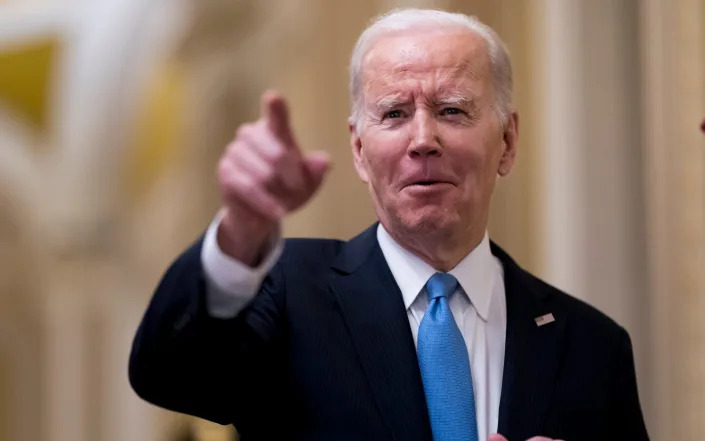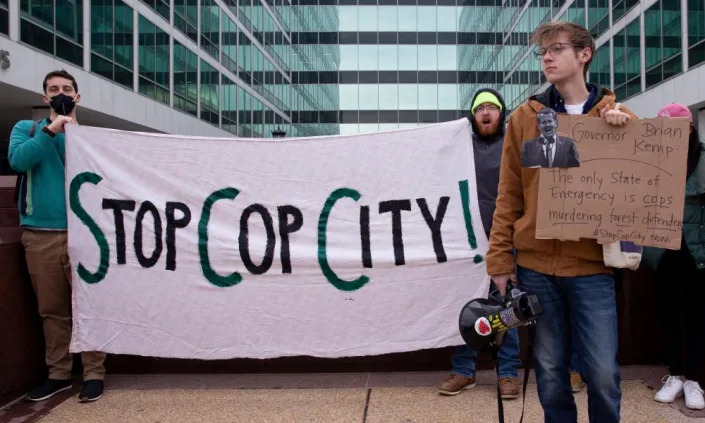OLD FASHIONED CRIMINAL CAPITALI$M
Corruption-trial coverage getting little attentionCharita M. Goshay, The Repository
Sun, March 5, 2023

Former Ohio House Speaker Larry Householder leaves the Federal Courthouse with Mark Marein, Householder’s attorney, after a day at the courthouse during his trial for racketeering conspiracy on Thursday, Feb. 2, 2023, in Cincinnati. Larry Householder and former Ohio Republican Party chair Matt Borges are charged with racketeering in an alleged $60 million scheme to pass state legislation to secure a $1 billion bailout for two nuclear power plants owned by FirstEnergy
We're in the midst of an era in which the means and ability to communicate has never been easier, yet serious stories and the coverage of the things which really matter often have to fight for readers' attention.
To borrow from the Irish writer Seamus Deane, we appear to be stuck somewhere between "Boredom and Apocalypse."
Currently, former Ohio House Speaker Larry Householder is on trial for racketeering, accused of orchestrating a $60 million bribe from FirstEnergy officials, who buttonholed the legislature in 2019 to approve House Bill 6, which granted the utility a $1.3 billion subsidy for two nuclear power plants while increasing consumer rates and reducing subsides for clean/renewable energy projects.
Mathematically speaking, it's a cheap date.
But few if any folks have been paying much attention to Householder's trial, we must suppose because it's not entertaining enough, though House Bill 6 is literally taking money out of their pockets. According to Democratic state Reps. Casey Weinstein of Hudson and Jeffrey Crossman of Parma: "Ohioans continue to pay $287,000 every single day for subsidies that bail out an out-of-state coal plant and are tied to the largest public corruption scandal in state history. The subsidies are estimated to cost Ohioans up to $1.8 billion by 2030."
A plugged nickel
We know from experience that lessons unlearned are often repeated. Ohio has a Murderers' Row of misappropriation by top officials, including former Attorney General Marc Dann, Canton-born Deputy State Treasurer Amer Ahmad, and legendary House Speaker Vern G. Riffe Jr.
Householder is the second consecutive Ohio House speaker to land in trouble, following Cliff Rosenberger, who resigned his post in 2018 during an FBI investigation of his travel expenditures and his dealings with the payday loan industry, which was waging a battle to kneecap any attempt to regulate its practices.
In 2005, the Toledo Blade broke "Coingate," a scandal in which $50 million of Ohio Bureau of Workers' Compensation funds was sunk into rare coins, a feat engineered by Tom Noe, a big-dog fundraiser, friend of Gov. Robert Taft, and who just happened to be a coin dealer.
Noe, whose companies made at least $1 million off the state, ended up in prison over illegal campaign contributions. Taft, and two of his staffers acquired criminal records for violating the state's ethics laws for failing to report gifts they received from Noe.
The media gets blamed for a lot. People who tend to have the most to hide are often the loudest complainers, sowing seeds of distrust along the way. In some cases, the criticism is warranted, even welcome, but who's at fault for decades of Statehouse corruption?
Who keeps voting for ambivalence?
Cornfed Machiavellis:Being Buckeyes doesn't mean we should act like nuts
The first draft of history
Reporting on state government is a thankless job because, even when it's done, it's far down the totem pole of stories getting read.
Yet, even if no one ever reads the stories, they matter because you have a right to know. Newspapers have a civic duty and an obligation to be the repository of record. It's the reason for their very existence.
They matter because newspapers remain, as Mark Twain put, "the first draft of history."
They matter because it's your money. For example, the FBI has launched a pay-to-play investigation of ECOT, the state's shambolic Electronic School of Tomorrow, which still owes you $117 million. The bureau, which also is looking into the workings behind the bill legalizing sports betting, has declared Ohio as one of the most politically corrupt in the country, describing the Householder case in "a league all its own," but Buckeyes don't appear to be bothered by that status.
Somewhere, Charles Ponzi is weeping with envy.
Charita M. Goshay is a Canton Repository staff writer and member of the editorial board. Reach her at charita.goshay@cantonrep.com. On Twitter: @cgoshayREP















